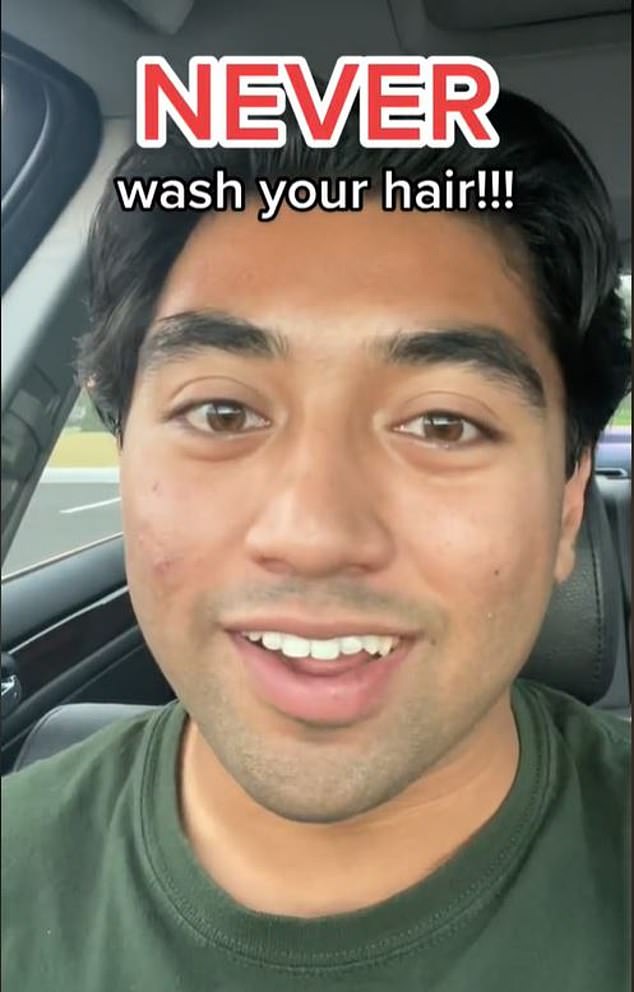Why the young men obsessed with the TikTok trend of ditching shampoo could end up losing more hair
Giving up shampoo and conditioner – and using just water on your hair – is a fad that has become increasingly fashionable in recent years.
Under the hashtags #noshampoo or #nopoo on social media, the trend originally appealed to environmentally conscious women who wanted to minimize the number of beauty products they used.
But the latest wave of devotees comes from a different demographic: teenage boys and young men, who are going shampoo-free in the hope that it will help them retain their hair and keep it thick and healthy.
They’re inspired to give it a try after seeing their peer group embrace the benefits on social media.
Typical is Kainoa Lam (@kainoalam), who said: ‘After I stopped using shampoo, my hair became thicker, more textured and started to smell better.’
TikToker Kainoa Lam (@kainoalam) said: ‘After I stopped using shampoo, my hair became thicker, more textured and started to smell better’
Another example is Humza Islam (@humza.islam), who has dedicated dozens of videos to the #noshampoo method on his TikTok channel.
In one video he claims it results in: ‘No more greasy/oily hair, no more irritation or itching, no allergic reaction to ingredients’ and says it can ‘fix dandruff, flakes and dryness’ and make hair ‘easier to style can make’. ‘.
However, dermatologists warn that this approach can actually worsen scalp conditions and, far from slowing hair loss, may actually hinder hair growth.
‘This approach is based on the theory that if you simply wash your hair with water, your scalp will adapt and produce just the right amount of oils to keep your hair in optimal condition,’ explains Dr Angela Tewari, a dermatologist who specializes in hair. , based in London.
‘But I can’t find any evidence that this is the case.
‘Plus, your scalp and hair collect dirt, oil and sweat – and to remove these effectively you need surfactants (cleansers). Water alone will not remove that dirt and oil.”
Experts suspect that part of the reason this trend is catching on is based on the fact that shampoos intended to treat oily hair have historically tended to be highly astringent.
This means they have stripped the hair and scalp of all oils, which can cause the scalp to produce too much oil to compensate and the hair to feel dry.
“But shampoos these days are not harsh,” says Dr Tewari. ‘They use gentle surfactants that remove dirt and oil without stripping the scalp or hair.’
Anabel Kingsley, a trichologist based at the Philip Kingsley Trichological Clinic in London, adds: ‘Using the right products for your hair texture that deliver the right level of moisture to your hair should not lead to stripping.
‘If your hair feels dry from regular shampooing, you are using the wrong shampoo.’
Social media posts have also led to distrust of common ingredients in shampoos.
“But there’s nothing wrong with the surfactants and sulfates (a type of surfactant) in shampoos,” says Dr. Anastasia Therianou, a dermatologist and scalp specialist based in London.
‘They keep the hair and scalp clean and don’t strip away all the oils.’
Although some products are marketed as being sulfate-free, she says, “the only reason you should avoid sulfates is if you are allergic to them—and this is actually quite rare.”
So rare that there is no published data about it. Experts say that most hair and scalp problems can be solved by using the right shampoo and washing more often.

Humza Islam (@humza.islam) has dozens of videos on his TikTok channel dedicated to the #noshampoo method
Still, some TikTok videos claim that ditching the shampoo can help solve scalp problems.
However, they often fail to distinguish between dry scalp, which can be caused by using the wrong shampoo, and dandruff, which is caused by a yeast.
And in fact, throwing away shampoo may not improve the condition of the scalp, but may actually worsen it, says Dr. Therianou. “If you don’t cleanse your scalp properly, the microbiome, or the collection of bacteria and fungi that live on the scalp, can become unbalanced,” she says.
‘That’s when a yeast called malassezia can multiply. Malassezia causes dandruff because the yeast feeds on the oil produced by your scalp and this process releases a byproduct that irritates the scalp.

Just as you wouldn’t wash your face with water alone or brush your teeth without toothpaste, you should apply the same to your hair and scalp, writes Claire Coleman
‘The result is redness, inflammation and flaking.’ This requires treatment with an antifungal shampoo.
Other scalp conditions – such as seborrheic dermatitis (similar to dandruff), eczema and psoriasis – can also worsen if your scalp is not cleansed.
This is because they rely on medicated shampoos and regular washing to keep them under control.
There are also rumors online that using shampoo can cause you to lose hair.
Some claim that the chemicals in shampoos cause hair to become dry and brittle, leading to breakage.
‘Contrary to many misconceptions, regular shampooing will not cause hair loss or additional hair loss,’ says Anabel Kingsley.
‘These hairs have already been separated from their blood supply at the follicle and washing with shampoo simply loosens them from the follicle.
‘It is normal to lose 80 to 100 hairs per day.’
For those concerned about hair loss, throwing away the shampoo may be the worst thing they can do.
“Conditions that make the scalp itchy can cause people to scratch and break hair at the roots,” says Dr. Therianou.
‘But when sweat, oil and dirt block the follicles, you may find that the hairs don’t grow as efficiently as they could.’
And while many #noshampoo enthusiasts continue to use styling products such as waxes and creams, this only serves to make matters worse.
‘Any product that contains oil or wax requires some sort of detergent to remove it from the hair. Water alone is not enough,” says Dr. Therianou.
It’s a bit like cleaning a greasy oven dish with just hot water and no detergent: it doesn’t work.
Ultimately, as Anabel Kingsley puts it, “you take your hair and scalp to the same places you take your face, and it gets just as dirty.”
And just as you wouldn’t wash your face with just water, or brush your teeth without toothpaste, or wash your clothes without detergent, she says, you should think about your hair and scalp the same way.
